Apu goes back to college in Calcutta after Ma's death in Aparajito, but moneyless, he drops out before graduation. He lives off tuition and gets some money writing short stories for magazines and by selling his books one by one. Harihar, Apu's father, was a playwright with his dreams shackled by daily drudgery of feeding a family. Apu seems to revel in the freedom afforded to him by orphanhood and bachelorhood. He is writing a novel, which he says to his close friend Pulu, is half autobiography (his poverty and resolve) and half imagination (love which he's still unaware of).
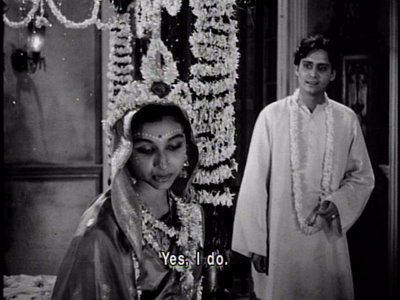
That changes, when he marries Aparna, Pulu's relative. Love seeps gradually into their chance relationship aided by Apu's care and Aparna's softness and before long they are inseparable.
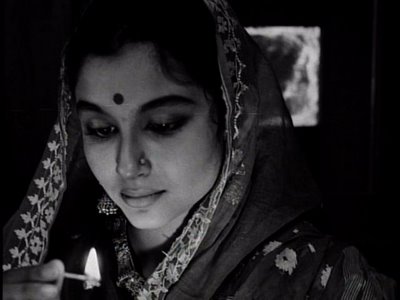
Aparna's face by the light of the matchstick that she used to light Apu's cigarette. "What's that in your eye?". "Kajal"
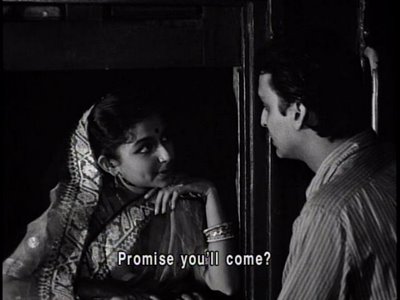
Aparna goes home for her first child and writes back to Apu reminding him of his promise. Apu spends the entire day trying to steal moments away from the prying eyes of people so he can read a line or two of what his fondest one has written.
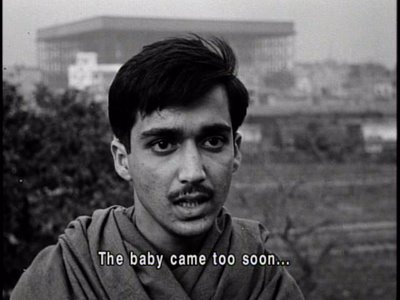
And just when he finishes the letter near home, Murari, Aparna's brother gives him the news.
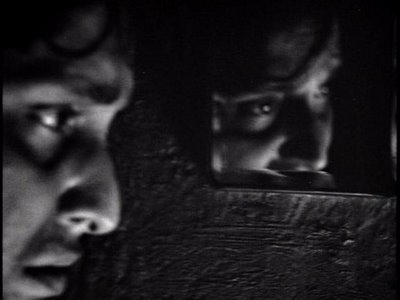
Everyone. Everyone who has been in Apu's life left him. A long silence in which even the clock stops ticking, or maybe it's time itself that has stopped.
This time, to live anyhow and move on is not Apu's resolve. It is his fatalism.
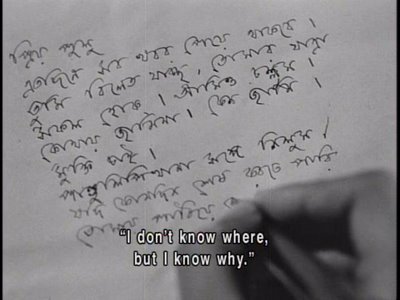
He writes to Pulu, "I want peace". He had been a karmyogi in the face of every bereavement. This time, it's renunciation.

The novel, Apu's single dedication before Aparna, is also no more. Is nothing left?
Five years hence, Apu has been roaming the country and now wants to go abroad... peace still not in sight. Pulu instead coaxes him to go fetch his son and care for him. Kajal has grown up at his grandfather's house.
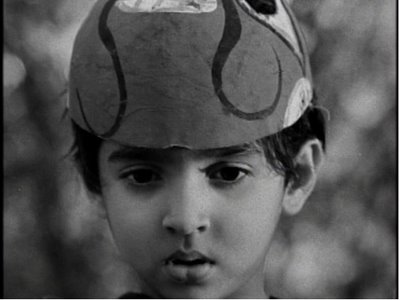
Kajal reminds one of what Apu was in Pather Panchali - playful, mischievious, innocent, curious. It takes a while for the child to warm up to his father, and then Apurba Kumar Roy takes the last piece of life that's still associated with him, with him. What survives, is life.

4 comments:
btw which language movie is this?n sir why you so much influenced by it?what made you watch it?it seems it had affected you deeply somewhere!!
Who are you?
Well, The trilogy of Pather Panchali, Aparajito, Apur Sansar has touched everyone who has seen them. I've seen them and captured them in pictures and words, so I remember.
http://isb2007.blogspot.com/2006/05/story-of-road.html
http://isb2007.blogspot.com/2006/06/aparajito-unvanquished.html
http://isb2007.blogspot.com/2006/06/aparajito-images.html
http://isb2007.blogspot.com/2006/11/apur-sansar.html
Hi Sumit,
I too finshed the trilogy recently and completely agree with you.
Loved all of them but was somehow perplexed by Apu's disdan for his child that he had not seen yet... could not connect with that (of course he loved his wife so much....)
Loreal has done a good job i guess, i get to see more of your forehead now :)
Apu's disdain for his kid... two reasons:
- He partially blames the child for Aparna's death
- Everyone he has loved has died. His subconscious prefers to love no one else now.
Post a Comment